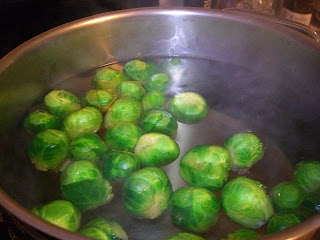 My first intensive schooling in intuition came when I learned to cross streets, my second when I learned to drive a car, and my third when I learned to cook (see "Running in Herds, Traffic, and Intuition").The cooking part began a year or two after I graduated from college with a going away dinner for some friends who were leaving Cambridge---and a three day stew. I bought Julia Child’s first cookbook, what became the first volume of Mastering the Art of French Cooking, and chose the most labor intensive dish I could find.
My first intensive schooling in intuition came when I learned to cross streets, my second when I learned to drive a car, and my third when I learned to cook (see "Running in Herds, Traffic, and Intuition").The cooking part began a year or two after I graduated from college with a going away dinner for some friends who were leaving Cambridge---and a three day stew. I bought Julia Child’s first cookbook, what became the first volume of Mastering the Art of French Cooking, and chose the most labor intensive dish I could find. Julia became my cooking teacher. Her clear and wonderful, if labor intensive, recipes produced food I was delighted to serve and eat. Because she provided such a strong base, she created what I will call a feeling for the palate--- or alternatively, for the recipe.
Her last direction was frequently to correct seasoning. Often it seemed that if I held the salt (or spice) shaker over the dish and went into a mentally blank but extremely attentive place, I would know exactly how much to put in. It certainly doesn’t happen all the time, but when it does, I have this clear crisp feeling of being on beam—almost as if I am communing with the dish.
Over the years I have consulted Julia less and less. A recent special project made me go back to her once again. I ate a wonderful pasta dish in a restaurant several years ago, which, among other things, contained a few brussels sprouts. Cut in two, they had been browned in such a way that they became all crispy on their cut end. The contrast of textures and tastes was divine.
Eventually, I decided I wanted to try to make them for myself. I have cooked brussels sprouts
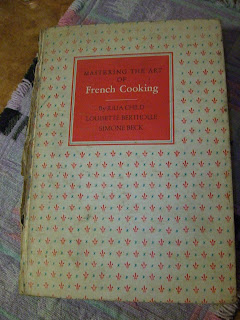 only very occasionally---boiling them the ten minutes that the recipe I used suggested---in a pan just large enough to accommodate them. The results were OK, but less than wonderful; the sprouts tended to end up a dull green.
only very occasionally---boiling them the ten minutes that the recipe I used suggested---in a pan just large enough to accommodate them. The results were OK, but less than wonderful; the sprouts tended to end up a dull green.The key, Julia said, was a huge pot of boiling water, a short cooking time---about 6 minutes---and taking them out at their greenest. When I tried it, they turned bright green in no time at all---maybe two minutes. I hesitated a moment and then took them out.
I went on to the second step—cutting them in half and trying to brown them in butter. They hardly browned at all. However my curiosity was piqued. I thought intuition might tell me how brown the butter had to be---instead of my conditioned reactions of all kinds, combined with my thinking mind. Over a period of months I cooked many batches of brussels sprouts—each time trying a different way to brown them. Indeed intuition did have the role in this project, and somewhat like I anticipated, but I got in which part wrong.
I began to notice something interesting about the initially cooking step---the sprouts stayed bright green for a while---maybe as long as a minute and a half. Nonetheless something in me knew when they were at their brightest green and would be at their most delicious. This means a tiny bit crunchy inside, with a wonderful mustard or perhaps horseradish-like flavor.
I would watch them attentively and all of a sudden I would just know it was time to take them out. It certainly had nothing to do with thinking. In fact when I let myself think, I was less alert to this other kind of knowing and less likely to respond appropriately.
When I was a postdoc---way before I began to study intuition---I had my first experience of “knowing more than I know.” Often before I went home for the evening, I would have to add a liquid sample to a thick slurry of beads in a column and wait until it very slowly flowed in. Often it would get stuck.
One evening I knew that the sample was flowing even though I realized that the change in the fluid level in the column above the slurry of beads was imperceptible to my conscious mind. Astounded, I checked several more times and came to the same conclusion. This knowing had an extremely grounded, even physical feeling to it, though I could not identify its source.
I sensed it was not extraordinary knowing, but something every bit as interesting. Apparently our ability to detect visual change below awareness is greater than our ability to detect visual change at a conscious level. Since then I have become familiar with an ever growing body of work that confirms that indeed the unconscious can register and integrate stimuli that do not make it to awareness---see, for example, this 2000 review article by Philip Merikle . The study of unconscious perception of all kinds is a hot area of investigation in cognitive science.
I suspect there is also a similar explanation for my ability to sense when the brussels sprouts will be at their most flavorful as well. Probably my unconscious is aware of gradations in bright green that my conscious mind cannot distinguish. It may also follow the rate of change of the color to capture when it is at its brightest.
Perhaps there is a similar type of physiological explanation for my sometimes ability to stand over the pot in an apparently blank but attentive way and know just how much salt to put in---and also to get a clear signal that it is so. Could the vapors above the pot contain essential clues?
Of course I cannot rule out that an even more obscure aspect of the human ability to know has a role in this situation---or indeed any of these situations. But at least with the first two, a reasonable sounding explanation based on the greater acuity of our unconscious perceptual abilities makes it unnecessary to go any further, at this point anyway.
Currently I am still working on the second step---browning the brussels sprouts. After trying everything I could think of---different degrees of brownness of the butter, different pans, oil instead of butter, dipping the ends in different flour
 mixtures---I realized that it was time to bite the bullet. I had to attempt to dry the brussels sprouts after the initial cooking---an absurd-sounding notion I had been hoping to avoid. After a lot of thinking, I decided the best I could do was to put the newly cut cooked brussels sprouts on paper towels for a while.
mixtures---I realized that it was time to bite the bullet. I had to attempt to dry the brussels sprouts after the initial cooking---an absurd-sounding notion I had been hoping to avoid. After a lot of thinking, I decided the best I could do was to put the newly cut cooked brussels sprouts on paper towels for a while. This time they browned beautifully. After sitting a bit, they were scrumptious. The tangy, moist, fresh, mustardy sprouts contrasted in a profound way with the rich, deep, dark, taste of the burnt ends.
But alas they are still not really crispy. I guess I will have to go through everything I already tried before---this time with the paper towel drained sprouts. It is hardly a burden, but a labor of culinary and gustatory love.

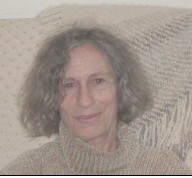

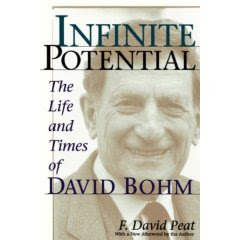


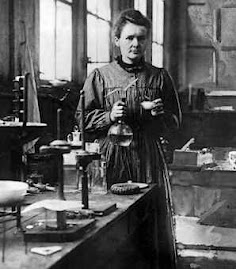






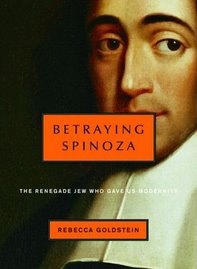

8 comments:
Lois
Here is a recipe for crispy brussels sprouts.
In a bowl mix brussels sprouts, olive and brown sugar.
Spread them on a baking sheet and bake at 450 for about 30 minutes-
check them towards the end.
They are delicious.
Maria
"But alas they are still not really crispy."
I don't think crispy is such a good idea for brussel sprouts -- but it's nice to have the bright green color and the mustardy taste.
Fred Owens
This is great - I love crispy brussels sprouts, especially with garlic. I slice the sprouts.
And, I love the connection with intuition and cooking. I have a 'sense' for when the food is done, even from the other room. Mostly it's linked to smell but it's a clear sign that the food is done cooking.
I also have intuition connected to taste. Sometimes when I coach people, a taste springs to mind (or palate). If I ask them about the relevance for them, it usually has a message for them. Bizarre, I know, but also fun!
Hi Lois,
I liked your article. The idea of sub-visual perception, and how it can apparently be trained, is interesting.
Have you ever tried roasting brussel sprouts? I put them in a pyrex dish with olive oil and coarse salt and roast them on 400 until they are brown and crispy. Very yummy.
Regards,
Lisa
Thanks for these recipies for crispy brussels sprouts. I look forward to trying them
Fred you are outnumbered (unless of course it is a quy thing). Stop by when you are next in Boston; I will make you some crispy brussels sprouts and try to show you the error of your ways.
Lois
I love this piece. I cook only by intuition: what's in the garden, the refrigerator, and/or on the spice shelf all combine to make the one-of-a-kind dinner for one specific night. My kids knew that, even if they liked the dish, I couldn't really reproduce it, only approximate the taste.
Rosie Rosenzweig
Lois,
I love brussels sprouts and am a closet eater because my family hates them. I can't wait to try these new recipes. I think cooking is one of the most intuitional activities I do. Because it's so sensual: smell, taste, sound, sight, and touch are all necessary for food to be delicious. I would even add a spiritual aspect: intention and focus. Without these last two, food tastes absent-minded and dull.
Penina
Hi Lois,
Thanks for a really interesting post. I agree completely about the importance in cooking of intuition.
I also have a suggestion for your brussels sprouts recipe. My mother cooks them in what she calls the traditional French way: she stirs them in a pot (just enough of them to cover the bottom) with several tablespoons of butter and about 1/4 inch of water. The water steams them and gets them half cooked, and, when it evaporates (around the time they start turning bright green), the butter browns them. They're supposed to turn out nice and brown and crispy on the outside and slightly crunchy on the inside. You'd have to experiment with this to get the details right, but maybe it will produce what you want. Happy cooking!
Margaret
Post a Comment